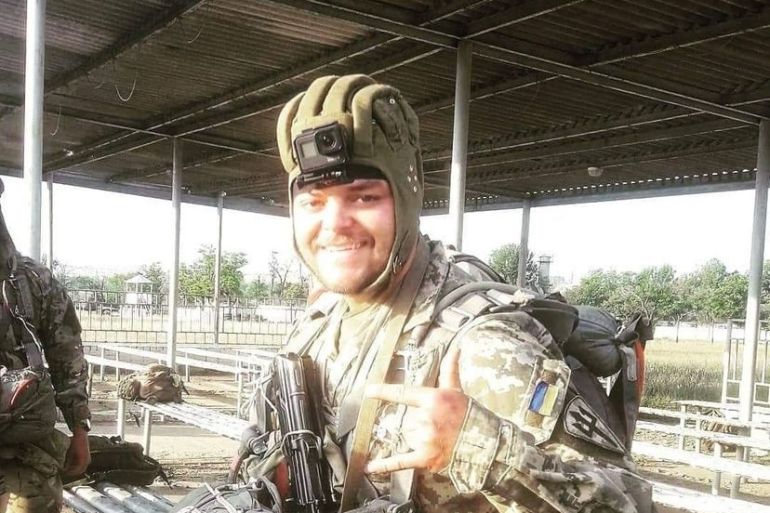On Ukraine’s front line, Britons battle Russia-backed separatists
A handful of British soldiers fighting against Russia-backed separatists in Ukraine say they are motivated by a sense of duty.

Mariupol, Ukraine – In 2018, fed up with working long hours and commuting in London, Sean Pinner wanted to travel.
Friends in Ukraine told him about a training opportunity with the National Guard, so he hopped on a plane. When the law changed and allowed foreigners to serve, he signed up for the military.
Keep reading
list of 4 itemsHow are Russian media outlets portraying the Ukraine crisis?
US and Russia spar over Ukraine crisis at UN Security Council
Latest Ukraine updates: UK PM warns of ‘clear danger’ to Ukraine
“Now I’m married and with my adopted city of Mariupol under threat from Russian-backed separatists, it’s inspired me to stay longer,” the 48-year-old section commander told Al Jazeera, in Ukraine’s far east. “I feel a need to protect the Ukrainian way of life, even though I’m not Ukrainian.”
As world powers scramble to avert a Russian invasion of Ukraine, soldiers on Ukraine’s front line are watched by enemy drones. They dodge snipers and live in trenches surrounded by snow, fighting Russian-backed separatists.
And alongside the thousands of Ukrainian troops stationed along the border, are a handful of British soldiers like Pinner who feel a sense of duty.

While the UK is considering a major NATO deployment to Eastern Europe, it has so far stopped short of sending extra troops to the country, fearing it would cause a further escalation.
The British soldiers here now were serving in the Ukrainian army before the latest tensions began.
They say they will continue to fight for a country that is not their own, despite fears of large-scale military action.
“It’s been like this for years,” said Pinner. “It’s only new to Europe, who have finally woken up to what’s happening here.”
There are three British nationals and one Croatian in his unit, the Marines 1st Battalion, as well as Ukrainian citizens – and the “comradeship is great”, said Pinner.
One of the Brits is Aiden Aslin, 28, a private who previously fought against ISIL (ISIS) with the People’s Protection Units (YPG) in Syria.
Despite his previous experience, he said this war is mentally demanding due to the style of fighting: trench warfare.
The frontline has not moved since a ceasefire deal was reached in 2015, so soldiers stay in one place for six to nine months.
“It is mentally exhausting, the threat of danger is constant and something as simple as going to the toilet could end up with you getting injured because drones can drop grenades,” he said, adding that the cold – as low as -30 C (-22°F) in winter – is brutal.

Since the conflict began in 2014, when Russia invaded and annexed Crimea and backed separatists in two breakaway territories in the country’s east, it is understood that at least 17,000 people have travelled to Ukraine to fight for militias on both sides of the divide.
Many have been from Russia or former Soviet Republics such as Azerbaijan and Georgia, but according to the Norwegian Institute of Foreign Affairs, up to 1,000 Westerners have joined the fight.
Some are driven by political beliefs, on the far right or far left of the spectrum.
“The conditions on the front are grim, especially in winter. We are constantly observed by enemy drones, often they drop nice surprises for us. Snipers are always a threat and a big danger is trench sabotage – separatists come in at night and lay traps, mines or tripwires along trench walkways,” said Pinner.
He served for nine years in the Royal Anglian Regiment and is now one of the oldest in his unit.
“I’ve always got something to prove,” he said.
On Sunday, Foreign Secretary Liz Truss announced that the UK is willing to deploy more forces to Estonia. Britain currently has more than 900 military personnel based there, as well as 100 troops deployed in training roles in Ukraine and approximately 150 soldiers in Poland.
London has already dispatched anti-tank weapons for defensive use and the HMS Prince of Wales aircraft carrier is currently on standby to move within hours should tensions rise further.
UK Prime Minister Boris Johnson is visiting Kyiv on Tuesday, and officials will finalise the details of the UK troop offer at NATO’s headquarters in Brussels, Belgium, this week.
At the same time, the UK and US have stepped up their rhetoric about the threat Russia poses and some British and American staff and dependents have been withdrawn from their embassies in Kyiv
Last week, the UK said that as many as 60 Russian battle groups were now on the Ukrainian border and the US has claimed that there are indications that Russia has positioned stocks of blood and other medical supplies for its troops.
Ukraine’s President Volodymyr Zelenskyy has played down the current threat, arguing that the country has been menaced by Moscow since 2014.
As well as visiting Kyiv, the UK’s Johnson will talk to Putin this week, while Truss and defence minister Ben Wallace will travel to Moscow for talks with their Russian counterparts in the coming days to help defuse tensions.
“The UK’s support for Ukraine has so far been really good compared to other countries,” said Aslin.
“I hope our prime minister and other MPs can push harder to increase support and give more equipment.”